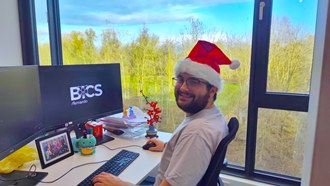Advent calendar - December 18th - Fernando M. Quintana
In the Zernike Institute Advent Calendar, we are presenting 24 short spotlights in December. In these specials, we highlight PhD students, postdocs, support staff and technicians of our research groups and team - providing a glimpse in their typical day at work. In Episode 18 meet Fernando M. Quintana, postdoctoral researcher in the Cognitive Systems group.

I'm Fernando M. Quintana, a postdoctoral researcher working on neuromorphic computing in the Cognitive Systems (CoSy) group led by Dr Erika Covi in the Faculty of Science and Engineering at the Zernike Institute. I'm excited by the opportunity to apply biological computational principles to adaptive and energy-efficient artificial intelligence systems using emerging memory devices. Artificial intelligence systems have the potential to self-adapt and learn from their own experience to solve different problems and tasks, or even learn new tasks! For example, imagine that a system is able to identify different animals such as raccoons and ostriches, but we suddenly present it with a duck. It could learn by itself that it is a new animal! (without forgetting the others). But this is increasingly difficult to apply to an energy-efficient embedded system, because continuous learning requires large computational resources. However, by taking inspiration from biological computational primitives, we can create new systems that can operate efficiently in this way, using neuromorphic computing. One of the key features is the co-location of memory and computation, also known as in-memory computing. This allows us to increase the speed of computation and reduce the cost of data communication. If we want to make neural networks work in hardware, we need new technologies that can provide local, non-volatile memory devices that don't need to be powered all the time. By incorporating new memory devices, such as memristive devices and ferroelectric components, into processing units, we can achieve in-memory computing, which reduces energy consumption and speeds up processing. By taking a multidisciplinary approach, co-developing devices, circuits and algorithms, we can create new sustainable machine learning systems that can continuously learn and adapt.
Most of my days are spent coding and running simulations of different neural networks. However, my daily routine has to start with a good cup of coffee with my colleagues and friends in the office to start the day with energy. I always like to have discussions with the people around me and try to keep a good mood and a positive attitude, especially during stressful times. I'm lucky to be in a group of amazing people who all come from different backgrounds (device engineer, circuit designer, computer science) and always have new ideas to work on (sometimes crazy ideas). After work I do one of my favourite things to relax, music. I'm a pianist and can spend hours playing music to relax and get away from work. But probably my favourite thing is spending time with the friends I have made here.
The most exciting phrase to hear in science, the one that heralds new discoveries, is not 'Eureka!' (I found it) - but 'That's funny...'
- Isaac Asimov
More news
-
15 September 2025
Successful visit to the UG by Rector of Institut Teknologi Bandung
